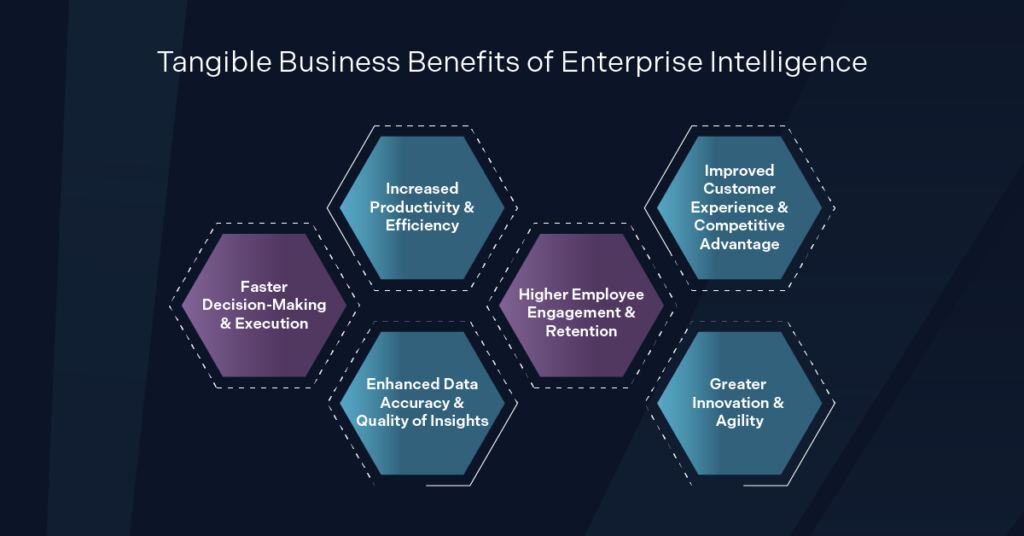Tangible Business Benefits of Enterprise Intelligence

Businesses are inundated with data. But raw data alone doesn’t guarantee success. Effective utilization of information is what drives results, transforming data into actionable, timely insights that guide strategy and improve performance.
Traditional tools like Knowledge Management (KM), Enterprise Search (ES), and Business Intelligence (BI) were built to support these goals. But on their own, they fall short. While each has value, they often operate in silos, creating fragmented experiences that limit their potential.
In many of my past roles, I’ve seen organizations struggle with outdated systems, fractured insights, and disconnected processes. These limitations slow down decision-making, hinder collaboration, and ultimately affect revenue.
This gap has given rise to Enterprise Intelligence—an integrated, AI-powered approach that amplifies knowledge management and enables organizations to operate with clarity, speed, and confidence.
Evolving Beyond Traditional Tools
While traditional KM systems have played a vital role in organizing institutional knowledge, many rely heavily on manual updates and content maintenance, limiting their ability to scale and adapt in real time. Enterprise Search solutions excel at retrieving information, but they can lack the context to determine whether that content is complete or actionable in a given moment. And while BI dashboards offer excellent visibility into structured data, they often miss the unstructured insights—the human knowledge, context, and nuance—that matter most.
The limitations of these individual tools highlight the need for a smarter, unified approach that turns scattered knowledge into a strategic advantage.
The Value of Enterprise Intelligence
See how over 115 companies quantify the impact of Enterprise Intelligence in our new report.
Learn More
Understanding Enterprise Intelligence
Enterprise Intelligence unifies KM, ES, and BI, with knowledge management acting as the connective tissue that links data to decision-making. Rather than passive storage and retrieval, Enterprise Intelligence provides real-time business intelligence by continuously refining and contextualizing knowledge, turning data into a strategic asset for efficient decision making, collaboration, and sustained competitive advantage.
Enterprise Intelligence addresses a key reality: most organizations have the data they need to make significant decisions, but that data is scattered, stale, or hidden in silos. Enterprise Intelligence helps unify these disparate data sources and ensures decision-makers get the whole picture, without delay or confusion. This shift unlocks exponential value from the knowledge your company is already generating.
6 Benefits of Enterprise Intelligence
Shifting from passive knowledge storage to knowledge activation has a ripple effect across the business. Backed by findings from Bloomfire’s Value of Enterprise Intelligence report, based on data from over 10,000 employees across 115 companies, these six benefits illustrate how Enterprise Intelligence transforms both day-to-day work and long-term business performance.

1. Real-Time Business Intelligence
Enterprise Intelligence significantly reduces the time employees spend searching for information by up to 46%, allowing faster and more informed decision-making. Companies leveraging real-time business intelligence are 4x more likely to exceed their objectives and key results (OKRs) than those using traditional methods.
Real-world Impact: A Fortune 100 insurance firm increased call-center efficiency by 12.5% using AI-powered Enterprise Intelligence, enabling faster responses without hiring additional staff.
2. Efficient Decision Making with Enhanced Data Accuracy
With Enterprise Intelligence, organizations report an 80% improvement in employee decision-making accuracy. Precise, contextual insights reduce operational risks, increase regulatory compliance, and drive consistent, high-quality outcomes.
Real-world Impact: A regional bank improved operational efficiency and compliance, influencing 37% of their annual revenue by ensuring data accuracy and fostering trust internally and externally.
3. Improving Employee Productivity
Enterprise Intelligence eliminates up to 32% of redundant tasks, significantly reducing duplicated efforts and unnecessary work. Organizations leveraging this can save on average $2.69 million per year per 100 employees by cutting costs related to information searches, duplicated tasks, and inefficient onboarding processes.
Real-world Impact: A global toy manufacturer saved $4.1 million annually in productivity costs and unlocked $131.8 million additional revenue by accelerating product innovation cycles.
4. Higher Employee Engagement and Retention
Enterprise Intelligence streamlines onboarding, cutting new employee ramp-up time by up to 50%, dramatically reducing the frustration associated with searching for crucial information. Employees at companies adopting Enterprise Intelligence report being 31% more empowered, 36% more confident, and 26% more productive.
Real-world Impact: A leading tax preparation service reduced onboarding time by half, saving over $11.9 million annually, while significantly increasing employee satisfaction and engagement.
5. Greater Innovation and Agility
Organizations adopting Enterprise Intelligence experience accelerated innovation, launching new products 30% faster than competitors. Enterprise Intelligence creates a collaborative environment where specialized knowledge is amplified and shared broadly, dramatically increasing agility.
Real-world Impact: A global financial institution used Enterprise Intelligence to amplify its research team’s impact, enabling a small group of analysts to serve insights to over 1,700 professionals, effectively tripling their productivity.
6. Improved Customer Experience and Competitive Advantage
Companies leveraging Enterprise Intelligence report customer service issue resolutions up to 32% faster, achieving an average 28% improvement in Net Promoter Scores (NPS). Additionally, the consistency of customer experience across departments and regions increases by 42%.
Customers today expect fast, informed responses. Enterprise Intelligence ensures support teams have instant access to past interactions, best practices, and company knowledge, enabling every rep to act with the speed and insight of your top performers.
Real-world Impact: An outsourced customer management provider increased service consistency and efficiency by nearly 30%, leveraging Enterprise Intelligence to create economies of scale and exceptional customer experiences.
Position Your Organization for Long-Term Success
Today’s complex business environments demand agility and strategic insight. Enterprise Intelligence isn’t just about keeping pace; it’s about leading the market. Organizations that invest in Enterprise Intelligence are addressing the immediate pressures of decision-making, productivity, and customer satisfaction and positioning themselves for long-term resilience and growth.
As data volumes grow and markets evolve, the real question isn’t whether you can afford to invest in Enterprise Intelligence, but whether you can afford not to.
Unlock Enterprise Intelligence
Discover how Enterprise Intelligence drives productivity, innovation, and growth.
Learn More

How to Improve Customer Service: 9 Strategies to Automate Success

7 Best Customer Service Knowledge Management Systems in 2026

The 6 Knowledge Management Trends That Redefine Strategic Intelligence in 2026

Estimate the Value of Your Knowledge Assets
Use this calculator to see how enterprise intelligence can impact your bottom line. Choose areas of focus, and see tailored calculations that will give you a tangible ROI.

Take a self guided Tour
See Bloomfire in action across several potential configurations. Imagine the potential of your team when they stop searching and start finding critical knowledge.
